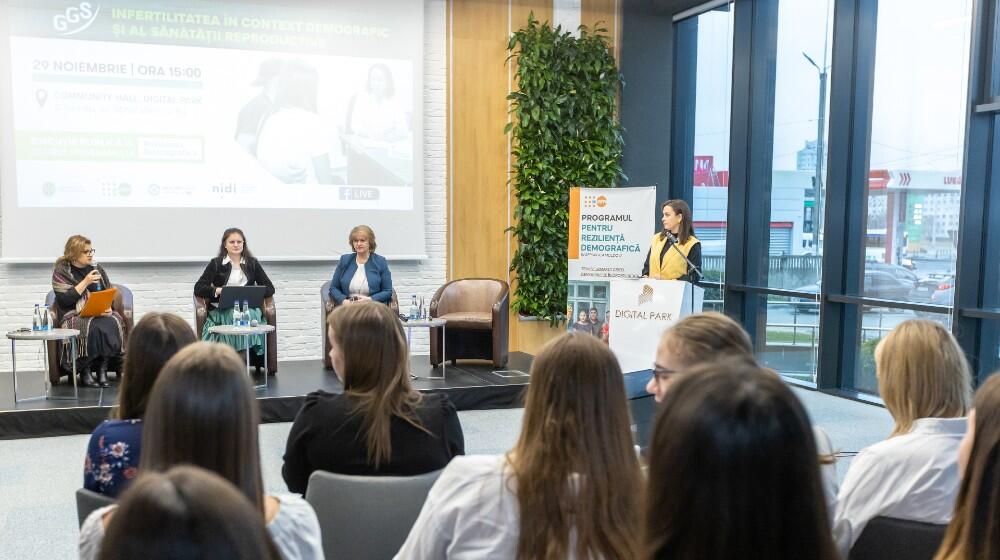11% of the population of reproductive age in the Republic of Moldova say they face infertility problems after trying to conceive a child in the last 12 months. Infertility problems are equally associated with women and men, according to data from an analysis of the infertility phenomenon in Moldova based on the Generations and Gender Survey, launched at a public event in Chișinău organised by the UN Population Fund (UNFPA) in collaboration with the Ministry of Labour and Social Protection of the Republic of Moldova.
According to analysis carried out by a team of researchers from the Avenir Health Center from the United States, urban couples report more infertility issues than rural couples. This is explained by the increased level of information and the possibilities of investigation and treatment that are more accessible to city dwellers. At the same time, about half of people do not know the cause of infertility and only half of them sought specialist treatment.
„Infertility, like low fertility, is a problem with social and medical implications, directly affecting the demographic situation. That is why the Ministry of Labour and Social Protection in partnership with the UN Population Fund has come up with several legislative amendments based on the data from the Generations and Gender Survey to support Moldovan families to have the desired number of children”, mentioned Felicia Bechtoldt, State Secretary, Ministry of Labour and Social Protection.
A case study of infertility in couples treated by in vitro fertilisation (IVF), which covered a sample of 244 couples, carried out by the Centre for Reproductive Health and Medical Genetics, was also presented during the event. According to it, more than half of the infertility cases analysed in both women and men are based on a reproductive tract health condition (tubal obstruction), which is a consequence of genital tract infections, including sexually transmitted diseases, incurred during life.
According to experts, this reveals the need for prevention policies aimed at increasing the information and education of the population, including the younger generation, on safe sexual behaviour.
„Topics concerning sexual and reproductive health are still considered “taboo”’. It is time for Moldovan society to become aware of the importance of measures to inform and educate the population in the field of sexual and reproductive health, which has the role of preventing risky sexual behaviours, especially among adolescents and young people, which would ultimately contribute to reducing the incidence of infertility in the Republic of Moldova”, mentioned Tatiana Zatic, Head of Department, Ministry of Health.
The study on infertility in the context of population and reproductive health is part of the Demographic Resilience Programme of the UN Population Fund (UNFPA), which supports the Moldovan authorities in developing evidence-based population policies.
„Every person and each couple has the fundamental right to realise their reproductive aspirations and to have as many children as they want. Infertility is a challenge for many couples, with both social and health implications, which is why it is important to have a multi-sectoral approach in this area and measures adapted to the needs of all people, so that no one is left behind. Supporting women and men to achieve their desired fertility, along with other population policy measures, are essential components that contribute to Moldova's demographic resilience”, mentioned Nigina Abaszada, UNFPA Moldova Resident Representative.
It should be noted that the problem of infertility affects millions of people of reproductive age around the world, with negative impact on families, communities and countries. Estimates suggest that between 48 million couples and 186 million individuals experience infertility globally. Worldwide, 10-25% of all couples of reproductive age are affected by infertility.
The analysis of the infertility in Moldova on the basis of Generations and Gender Survey was carried out in collaboration with the Avenir Health Center from the USA, and the qualitative case study was developed with the support of the Center for Reproductive Health and Medical Genetics.
The Gender and Generations Programme in the Republic of Moldova is implemented by the UN Population Fund in partnership and with the financial support of the Ministry of Labour and Social Protection and India-UN Development Partnership Fund. The project partners include the Netherlands Interdisciplinary Demographic Institute and the National Bureau of Statistics, which developed the study sample.


